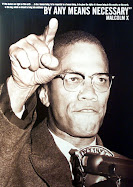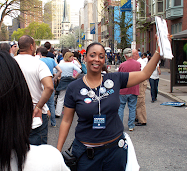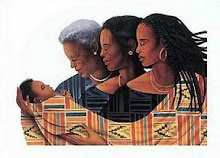Sister Maya Angelou ~ In Her Own Words
Sister Maya Angelou was born on April 4, 1928, in St. Louis, Missouri, under the name Marguerite Annie Johnson, and was raised in Stamps, Arkansas, and San Francisco, after her parents sent her off to live with her grandmother in California when she was fresh with a white store clerk in Arkansas, the Associated Press reported.
She grew up to become a singer, dancer, actress, writer and Hollywood's first female black director.
Angelou had an impressive list of accolades: She was a three-time Grammy winner and was nominated for a Pulitzer, a Tony, and an Emmy for her role in the 1977 groundbreaking television mini-series "Roots."
But her success didn't come easily. Angelou's life struggles were fodder for her work.
A few weeks after she finished high school, at 17, she gave birth to her son, Guy. A single mother, she supported her son by working as a waitress and a cook, but music, dance, and poetry were her true passions.
In 1960, she moved to Cairo, where she edited an English-language weekly newspaper. The following year, she went to Ghana to teach music and drama. It was in Ghana that she met Malcolm X, coming back to the U.S. in 1964 with him to help him build his new coalition, the Organization of African American Unity.
It was in 1970 that she published "I Know Why the Caged Bird Sings," a painful tale of growing up in Jim Crow South, which is now on children's reading lists in schools across the country (along with sometimes being censored for its raw account of rape and teen pregnancy).
"If growing up is painful for the Southern Black girl, being aware of her displacement is the rust on the razor that threatens the throat. It is an unnecessary insult," she wrote.
"'I thought that it was a mild book. There's no profanity," Angelou once told the AP. "It speaks about surviving, and it really doesn't make ogres of many people. I was shocked to find there were people who really wanted it banned, and I still believe people who are against the book have never read the book."
Between Angelou's fiction, non-fiction, and published verse, she amassed more than 30 bestselling titles.
Angelou was also a trailblazer in film. She wrote the screenplay and composed the score for the 1972 film "Georgia," and the script, the first-ever by an African-American woman to be filmed, was nominated for a Pulitzer Prize.
In more recent years, it was her interactions with presidents that made headlines. In 1993, she wowed the world when her reading of her poem "On the Pulse of the Morning" was broadcast live globally from former President Bill Clinton's first inauguration. She stayed so close with the Clintons that in 2008, she supported Hillary Clinton's candidacy over Barack Obama's.
She also counted Nelson Mandela and the Rev. Martin Luther King, Jr., as friends, and served as a mentor to Oprah Winfrey when Winfrey was starting out as a local TV reporter. When she was in her 20s, Angelou met Billie Holiday, who told her: "You're going to be famous. But it won't be for singing."
Angelou read another poem, "Amazing Peace," for former President George W. Bush at the 2005 Christmas tree-lighting ceremony at the White House.
In North Carolina, Angelou lived in an 18-room house and taught American Studies at Wake Forest University.
Oprah Winfrey speaks at Maya Angelou Memorial Wait Chapel at Wake Forest University
Marvin and BeBe Winans singing "Stand"
Michelle Obama Emotional Speech Maya Angelou Memorial VIDEO Wait Chapel at Wake Forest
Cicely Tyson speaks at Maya Angelou Memorial Wait Chapel at Wake Forest University
June 7, 2014
Cicely Tyson speaks at Maya Angelou Memorial Wait Chapel at Wake Forest University Cicely Tyson Maya Angelou pay their final respects to her at Wait Chapel at Wake Forest University WINSTON-SALEM, N.C. (AP) — Family, friends and famous admirers including first lady Michelle Obama, former President Bill Clinton and Oprah Winfrey plan to gather for a weekend tribute to poet, orator and sage Maya Angelou.
BeBe Winans speaks sings at Maya Angelou Memorial
Michelle Obama Emotional Speech Maya Angelou Memorial VIDEO Wait Chapel at Wake Forest University
Oprah Winfrey speaks at Maya Angelou Memorial Wait Chapel at Wake Forest University
Bill Clinton speaks at Maya Angelou Memorial Wait Chapel at Wake Forest University
Cicely Tyson speaks at Maya Angelou Memorial Wait Chapel at Wake Forest University
The service, set for 10 a.m. ET/7 PT, will be broadcast on Winfrey's OWN Network and streamed at www.Oprah.com/MayaAngelou.
Angelou is being honored as a renaissance figure and one of the 20th century's most famous black writers at a private memorial service planned later Saturday morning at Wake Forest University. Angelou died May 28 at age 86 after a remarkable life with important roles in civil rights and the arts.
READ UP: The essential Maya Angelou reading list
Born into poverty and segregation, Angelou rose to become an accomplished actress, singer, dancer and writer. Although she never graduated from college, she taught for more than 30 years at the private North Carolina university, where she was regularly addressed as Dr. Angelou out of respect for all the honorary degrees she received.
Her magnetism also drew her into friendships with famous figures from Malcolm X and Nelson Mandela to Clinton and Winfrey
Angelou was born Marguerite Johnson in St. Louis and raised in Stamps, Arkansas, and San Francisco. Her life included writing poetry by age 9, giving birth as a single mother by 17, and becoming San Francisco's first black streetcar conductor. She also once danced at a strip joint, shared the stage with comic Phyllis Diller and garnered career advice from singer Billie Holiday. She wrote music and plays, received an Emmy nomination for her acting in the 1970s TV miniseries Roots and danced with Alvin Ailey.
Tall and majestic, Angelou added heft to her spoken words with a deep and sonorous voice, describing herself as a poet in love with "the music of language." She recited the most popular presidential inaugural poem in history, On the Pulse of Morning, when Clinton opened his first term in 1993. She inspired many and became a mentor to Winfrey before she became a talk show host.
Angelou once worked as a coordinator for the Southern Christian Leadership Conference and lived for years in Egypt and Ghana, where she met Mandela. In 1968, she was helping the Rev. Martin Luther King Jr. organize the Poor People's March in Memphis, Tennessee, where the civil rights leader was slain on Angelou's 40th birthday.
Dr. Maya Angelou's 3-Word Secret to Living Your Best Life - Oprah's Master Class - OWN



Dr. Maya Angelou
was one of the most renowned and influential voices of our time. Hailed as a global renaissance woman, Dr. Angelou is a celebrated poet, memoirist, novelist, educator, dramatist, producer, actress, historian, filmmaker, and civil rights activist.
Maya Angelou was born Marguerite Annie Johnson in St. Louis, Missouri. Her parents divorced when she was only three and she was sent with her younger brother Bailey to live with their grandmother in the small town of Stamps, Arkansas. In Stamps, the young girl experienced the racial discrimination that was the legally enforced way of life in the American South, but she also absorbed the deep religious faith and old-fashioned courtesy of traditional African American life. She credits her grandmother and her extended family with instilling in her the values that informed her later life and career. She enjoyed a close relationship with her younger brother. Unable to pronounce her name because of a stutter, Bailey called her "My" for "My sister." A few years later, when he read a book about the Maya Indians, he began to call her "Maya," and the name stuck.
At age seven, while visiting her mother in Chicago, she was sexually molested by her mother's boyfriend. Too ashamed to tell any of the adults in her life, she confided in her brother. When she later heard the news that an uncle had killed her attacker, she felt that her words had killed the man. She fell silent and did not speak for five years.

Maya began to speak again at 13, when she and her brother rejoined their mother in San Francisco. Maya attended Mission High School and won a scholarship to study dance and drama at San Francisco's Labor School, where she was exposed to the progressive ideals that animated her later political activism. She dropped out of school in her teens to become San Francisco's first African American female cable car conductor. She later returned to high school, but became pregnant in her senior year and graduated a few weeks before giving birth to her son, Guy. She left home at 16 and took on the difficult life of a single mother, supporting herself and her son by working as a waitress and cook, but she had not given up on her talents for music, dance, performance and poetry.

In 1952, she married a Greek sailor named Anastasios Angelopulos. When she began her career as a nightclub singer, she took the professional name Maya Angelou, combining her childhood nickname with a form of her husband's name. Although the marriage did not last, her performing career flourished. She toured Europe with a production of the opera Porgy and Bess in 1954 and 1955. She studied modern dance with Martha Graham, danced with Alvin Ailey on television variety shows and recorded her first record album, Calypso Lady (1957).
She had composed song lyrics and poems for many years, and by the end of the 1950s was increasingly interested in developing her skills as a writer. She moved to New York, where she joined the Harlem Writers Guild and took her place among the growing number of young black writers and artists associated with the Civil Rights Movement. She acted in the historic Off-Broadway production of Jean Genet's The Blacks and wrote and performed a Cabaret for Freedom with the actor and comedian Godfrey Cambridge.
In New York, she fell in love with the South African civil rights activist Vusumzi Make and in 1960, the couple moved, with Angelou's son, to Cairo, Egypt. In Cairo, Angelou served as editor of the English language weekly The Arab Observer. Angelou and Guy later moved to Ghana, where she joined a thriving group of African American expatriates. She served as an instructor and assistant administrator at the University of Ghana's School of Music and Drama, worked as feature editor for The African Review and wrote for The Ghanaian Times and the Ghanaian Broadcasting Company.
During her years abroad, she read and studied voraciously, mastering French, Spanish, Italian, Arabic and the West African language Fanti. She met with the American dissident leader Malcolm X in his visits to Ghana, and corresponded with him as his thinking evolved from the racially polarized thinking of his youth to the more inclusive vision of his maturity.
Maya Angelou returned to America in 1964, with the intention of helping Malcolm X build his new Organization of African American Unity. Shortly after her arrival in the United States, Malcolm X was assassinated, and his plans for a new organization died with him. Angelou involved herself in television production and remained active in the Civil Rights Movement, working more closely with Dr. Martin Luther King, Jr., who requested that Angelou serve as Northern Coordinator for the Southern Christian Leadership Conference. His assassination, falling on her birthday in 1968, left her devastated. With the guidance of her friend, the novelist James Baldwin, she found solace in writing, and began work on the book that would become I Know Why the Caged Bird Sings. The book tells the story of her life from her childhood in Arkansas to the birth of her child. I Know Why the Caged Bird Sings was published in 1970 to widespread critical acclaim and enormous popular success.

Seemingly overnight, Angelou became a national figure. In the following years, books of her verse and the subsequent volumes of her autobiographical narrative won her a huge international audience. She was increasingly in demand as a teacher and lecturer and continued to explore dramatic forms as well. She wrote the screenplay and composed the score for the film Georgia, Georgia (1972). Her screenplay, the first by an African American woman ever to be filmed, was nominated for a Pulitzer Prize.
Angelou has been invited by successive Presidents of the United States to serve in various capacities. President Ford appointed her to the American Revolution Bicentennial Commission and President Carter invited her to serve on the Presidential Commission for the International Year of the Woman. President Clinton requested that she compose a poem to read at his inauguration in 1993. Angelou's reading of her poem "On the Pulse of the Morning" was broadcast live around the world.

Since 1981, Angelou has served as Reynolds Professor of American Studies at Wake Forest University in Winston-Salem, North Carolina. She has continued to appear on television and in films including Poetic Justice (1993) and the landmark television adaptation of Roots (1977). She has directed numerous dramatic and documentary programs on television and directed her first feature film, Down in the Delta, in 1996.
The list of her published works now includes more than 30 titles. These include numerous volumes of verse, beginning with Just Give Me a Cool Drink of Water 'Fore I Die (1971). Books of her stories and essays include Wouldn't Take Nothing For My Journey Now (1993) and Even the Stars Look Lonesome (1997). She has continued the compelling narrative of her life in the books Gather Together in My Name (1974), Singin' and Swingin' and Gettin' Merry Like Christmas (1976), The Heart of a Woman (1981), All God's Children Need Traveling Shoes (1987) and A Song Flung Up to Heaven (2002).
In 2000, Dr. Angelou was honored with the Presidential Medal of the Arts; she received the Ford's Theatre Lincoln Medal in 2008. The same year, she narrated the award-winning documentary film The Black Candle and published a book of guidance for young women, Letter to My Daughter.
Maya Angelou participated in a series of live broadcasts for Achievement Television in 1991, 1994 and 1997, taking questions submitted by students from across the United States. The interview with Maya Angelou on this web site has been condensed from these broadcasts.
------------------
Yes I Can
by Dr. Maya Angelou
When the land became water and
Water thought it was God,
Consuming lives here, sparing lives there,
Swallowing buildings, and devouring cities.
It was power, mighty power, grown careless
And intoxicated with itself, and
The American people were tested.
As a result of our tumultuous history,
There resides a thought in the American psyche
Which ennobles us high above the problems which beset us.
It appears and evicts despair.
It enters and wrests fear from its lodging.
Simply put, the idea is,
"Yes I can."
"I can overcome."
The one time slave says, "I have proved and am still
proving - I can overcome slavery."
The one time slave owner says, "I have proved and am still
proving - I can overcome slavery."
The North says, "I have proved and am still proving - I can
overcome the Civil War."
The South says, "I have proved and am still proving - I can
overcome the Civil War."
The American people can say rampant crime has not turned
our masses into criminals, and blissful peace has not lulled
us into contented laziness.
This song that was so needed by Americans when it was
written one hundred years ago and needed fifty years ago
by Americans during the Civil Rights Movement, will be of
great use to use, these days, as we reel beneath the blows of
a violent hurricane.
We shall overcome.
We shall overcome.
We shall overcome, I pray.
Deep in my heart, I do believe, we shall overcome.
Let us all pray.
Let us all work.
And, I know, we shall overcome.
My name is Maya Angelou. I am an American

by Dr. Maya Angelou
When I say... "I am a Christian"
I'm not shouting "I'm clean livin'."
I'm whispering "I was lost,
Now I'm found and forgiven."
When I say... "I am a Christian"
I don't speak of this with pride.
I'm confessing that I stumble
and need Christ to be my guide.
When I say... "I am a Christian"
I'm not trying to be strong.
I'm professing that I'm weak
And need His strength to carry on.
When I say... "I am a Christian"
I'm not bragging of success.
I'm admitting I have failed
And need God to clean my mess.
When I say... "I am a Christian"
I'm not claiming to be perfect,
My flaws are far too visible
But, God believes I am worth it.
When I say... "I am a Christian"
I still feel the sting of pain.
I have my share of heartaches
So I call upon His name.
When I say... "I am a Christian"
I'm not holier than thou,
I'm just a simple sinner
Who received God's good grace, somehow!
Dr. Maya Angelou visting Glide memorial Church in San Francisco
Maya Angelou - A Brave and Startling Truth - A Memorial, RIP
Introducing Miss Calypso! - Super Soul Sunday - Oprah Winfrey Network
Still I rise - Dr. Maya Angelou
Maya Angelou Poem "The Mask"
Maya Angelou's Poem For Nelson Mandela








































































